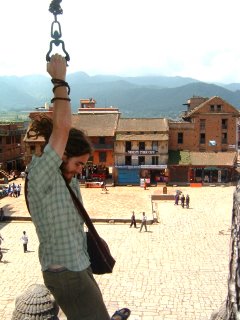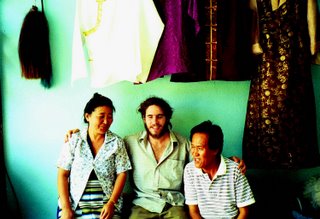CenLamar Feature: Ten Under Thirty
Part One of a series profiling of the work and service of ten Central Louisianans under the age of thirty.
Michael D. Smith
Religious Studies scholar, world traveler, humanitarian, Alexandria native.
After graduating college in 2005, Michael Smith moved from Houston to New Orleans to help with disaster relief.
Next month, Michael, a recent recepient of the Fulbright Scholarship, will travel across the Pacific once again (he spent over a year in Nepal as a college student) in order to conduct research on Newar and Tibetan Buddhism.
1. For those of us who don't know, what exactly is the Fulbright Scholarship?

The scholarship is a prestigious award given by the Department of State's Bureau for Educational and Cultural Affairs to students and scholars to conduct research in a foreign country, in order to "forward mutual cooperation and understanding between different cultures." It covers tuitions, living, shipping, travel and research expenses, allowing me to completely devote myself to my course of studies.
2. Where and what will you be studying?
I am looking into a contemporary sythesis of Newar (the indigenous population of Kathmandu) and Tibetan Buddhism that has been catalyzed by the influx of Tibetan refugees into the Kathmandu Valley since the Chinese takeover of Tibet in 1959. I will stay in a small new Tibetan Buddhist monastery located in the traditional Newar village Chapagaon, a little ways outside of Kathmandu. I'm fascinated by the way both Tibetans and Newars have made great effort to bridge large cultural gaps in language and ritual.
3. Interesting.
Yeah. You know, it's nice to see two sects of a religion attempting to reconcile and move forward, rather than killing each other. The road to heaven is no competition, after all!
I'd also like to add here that my interest in matters of the spirit was nurtured at Emmanual Baptist Church in Downtown Alexandria. Dr. Larry Taylor and Dr. Lee Weems have continued to be a source of inspiration and deeper knowledge. They share my conviction that truth is the monopoly of no one, and real understanding of one's own beliefs often comes through the lens of others.
4. Is there a particular reason or quality about Nepal that compels you?
Nepal is one of the most diverse places in the world, and cosmopolitan Kathmandu reflects that. Not only is there more than thirty ethnic groups, people from all over the world live and travel through the country. I love meeting someone from a place I've never heard of, and now that English has become an international language, it is not hard to have meaningful exchanges with most people. Not only do I have many Nepali, Indian and Tibetan friends there, I have made some great connections with Mexicans, Australians, Swedes, Germans, Japanese, and South Koreans, to name a few.
5. Talk a little about the cultural differences you've noticed between Alexandria, Louisiana and Kathmandu.
The pace is much slower, kinda like the difference between Alexandria and a northern city. For example, if I meet an acquaintance on the road in Kathmandu, we will stop, chat, and often break for tea. You don't find that relaxed openness very often in the USA.
Another example: In Nepal, most mothers don't particularly mind if you play with their small children, even as a stranger. People are just very friendly and trusting.
6. And the similarities.
In today's hyperconnected world, especially with the internet, we are seeing the emergence of a global youth culture. I believe that there is more difference today between the old and young than between Asians and Middle Easterners and Westerners. Nepalis our age connect with the same things we do: Bob Marley, Nirvana, Scarface, hashish, weblogs, late night dance parties, garage bands, an appreciation of the world as a unified organism...
7. Talk about the ways in which religion works itself into the every day lives of the Nepali people.
Their ancient temples and stories are not considered artifacts or history or museum pieces (like) the way we treat our own religious heritage. Every morning at sunrise millions of Nepali women ring a bell and make offerings of food, water, light, incense and flowers at the same
roadside shrine that their mothers and grandmothers have been doing for countless centuries. Theirs is truly a living tradition, and they believe that the divine can manifest itself in anything, including majestic groves of trees, rocks, rivers or crossroads. Every aspect of life points to the sacred; it is the sacred, and worshipped as such. It is actually quite beautiful. I have been moved to tears on more than one occasion by merely watching these simple acts of devotion. Hell, I'm tearing up right now thinking about it!
8. Onto another subject. You moved to New Orleans after Hurricane Katrina. What have you been up to in New Orleans?
In the beginning of December I began cleaning and rebuilding some friends' houses in Midcity, all of whom are organized through the Louisiana Himalayan Association, which is a social work organization that conducts development projects through Tulane University both in New Orleans and Dharamsala India. It has been very difficult at times, but NOLA is still the coolest city in America and the music scene is unrivaled. I've also been doing a lot of gardening; tomatos, cucumbers, peppers, herbs.
Anyway, I heard enough people bitching about how few Louisianians were there helping with the effort, how it was all Mexicans and Yankees. Man, I left the Himalayas to come back to Louisiana to help with the effort. I was also quite disappointed that there aren't more people from Alexandria that have moved down for temporary work, volunteering, etc.
9. Have you noticed a lot of positive change?
Absolutely. The community has pulled together like never before. Some pre-Katrina tenants have moved back into the houses we've been working on. Like us, many people are rebuilding bigger and better, now that they have the opportunity. It has been slow, and the most progress has been made where individuals work together on a small scale to bring their neighborhoods back. New Orleans is full of energetic youth from all over the country who are ready to create something amazing and progressive from the filth. I think that before the city gets permanantly and completely inundated with water after the sea levels rise from global warming in about 40 years we will truly see a lotus blossom from that swamp mud.
10. What do you think New Orleans will look like in ten years?
That all depends on the next few hurricane seasons, the levees, and the ability for humans to curb greenhouse gas emissions. But either way, it will be younger and more progressive.
11. Talk about your observations of Alexandria. I know you only come in every now and then, but certainly, you have a notion of where you want to see Alexandria.
Many people who leave their hometowns do so out of disgust. I love Central Louisiana; after all it is the place that has had the most impact on who I am. I want to see more of the revitalization of downtown that has been going on. I want to see less ugly corporate chains (Checkers, etc.) and more individual locally owned businesses (Cenla Perks, HOJ, Finnigans, etc.). And after seeing a really great performance at the riverfront, I believe it is one of the most underrated venues in the state. Much like the Azalea Trail is one of the most underrated hiking trails in the nation (Backpacker Magazine did an article about this a few years back).
But finally, the most important thing is education. I initially left Alexandria because I felt I was at a dead end with what I could learn in the public schools, so I went to LSMSA in Natchitoches. It was one of the best decisions in my life. I mean, look at LC, after all...
Thanks Michael. You're certainly going to scare a few people, but hopefully, you'll inspire many more. We appreciate your honesty and optimism.

